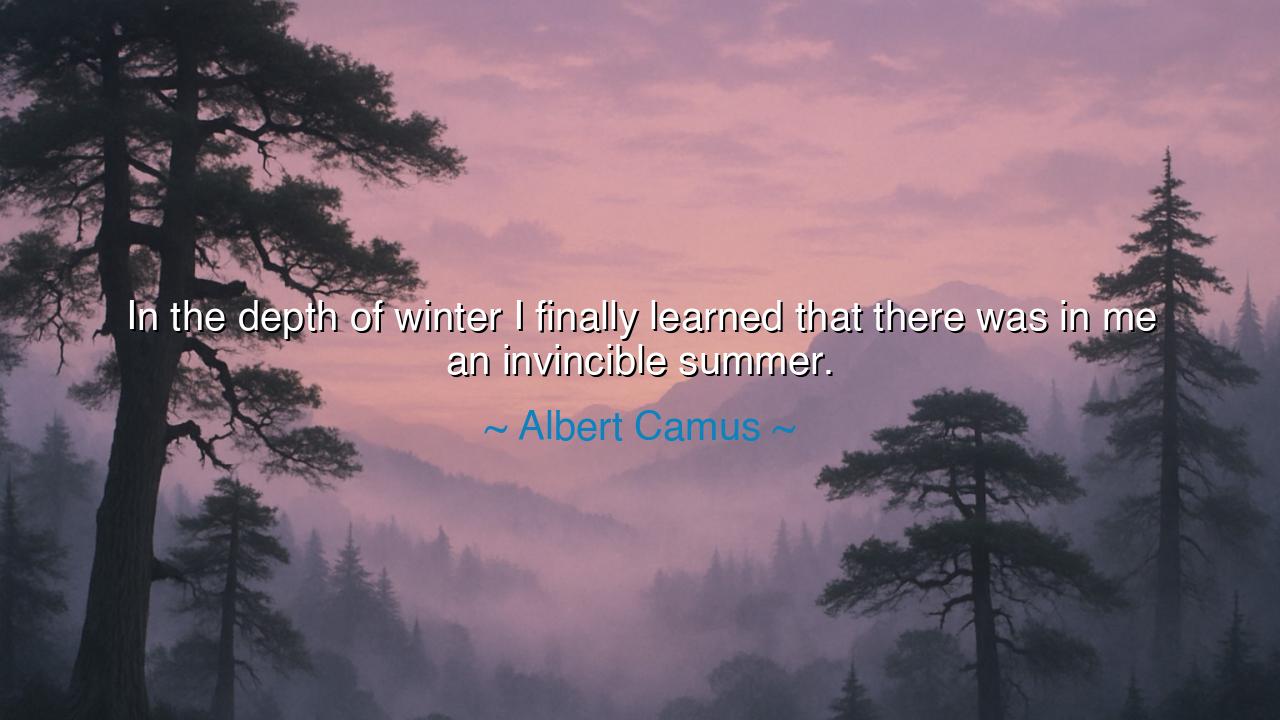
In the depth of winter I finally learned that there was in me an






Hearken, children of reflection, to the words of Albert Camus, the philosopher of the human spirit, who spoke with enduring clarity: "In the depth of winter I finally learned that there was in me an invincible summer." In these words lies a meditation upon the endurance of the soul, the hidden reservoir of strength within the human heart, and the eternal capacity for hope, joy, and courage even amidst the harshest adversity. Camus teaches that within the chill of suffering, the soul harbors a warmth and resilience that cannot be extinguished.
The first revelation is that adversity illuminates inner strength. Just as winter tests the mettle of trees, rivers, and men, the trials of life reveal the hidden warmth within. Camus reflects upon the moment of recognition—that even when surrounded by cold, darkness, or despair, there exists an inner spring of courage and vitality, a force that sustains, comforts, and propels the spirit forward. It is in the harshest conditions that the invincible nature of the human heart becomes known.
History offers vivid testimony to this truth. Consider Nelson Mandela, imprisoned for decades under the weight of injustice and cruelty. In the cold confines of his cell, stripped of freedom and dignity, he discovered within himself a strength that could not be broken. Like Camus’ invincible summer, Mandela’s inner fortitude sustained him, enabling him to emerge not only unbroken, but with the capacity for forgiveness, hope, and transformative leadership.
Camus’ insight also teaches that hope is a persistent companion, even when all external signs seem bleak. Winter, the symbol of hardship, loss, and suffering, cannot annihilate the spring within. This eternal summer—patience, courage, vision, and love—resides in every heart, awaiting acknowledgment. The recognition of this inner invincibility is itself a source of liberation, empowering the soul to endure and to act despite despair.
Even in daily life, the lesson endures. Those beset by illness, loss, or personal trials discover that the mind and heart can harbor light and warmth when the world offers only cold and shadow. Writers, artists, and thinkers have long found in adversity the spark that sustains creation, insight, and expression. Camus reminds us that resilience is cultivated in adversity, and that the human spirit is capable of enduring far more than it initially believes.
The metaphor of summer within winter teaches also the transformative power of awareness. To recognize the warmth within is to gain clarity, courage, and purpose. Just as a traveler in snow feels the sun’s heat through memory and anticipation, so too does acknowledgment of the invincible summer awaken the strength and resolve necessary to continue the journey, to act with perseverance, and to embrace life despite hardship.
Practically, the lesson is to seek and cultivate the warmth within during times of trial. Reflect upon personal strength, remember past triumphs, and nurture the qualities that sustain hope, joy, and courage. Recognize that every winter—every challenge, loss, or sorrow—carries within it the opportunity to awaken the invincible summer of the spirit, a power that endures beyond circumstance.
Thus, let this teaching echo through the generations: the depth of winter may chill the body, vex the mind, and burden the soul, yet within resides an invincible summer, a hidden reservoir of warmth, hope, and resilience. By acknowledging and nurturing this inner light, the human spirit rises, endures, and flourishes, transforming adversity into strength, wisdom, and enduring joy. Camus reminds us that the heart’s warmth is eternal, awaiting only the recognition of its invincibility.






AAdministratorAdministrator
Welcome, honored guests. Please leave a comment, we will respond soon